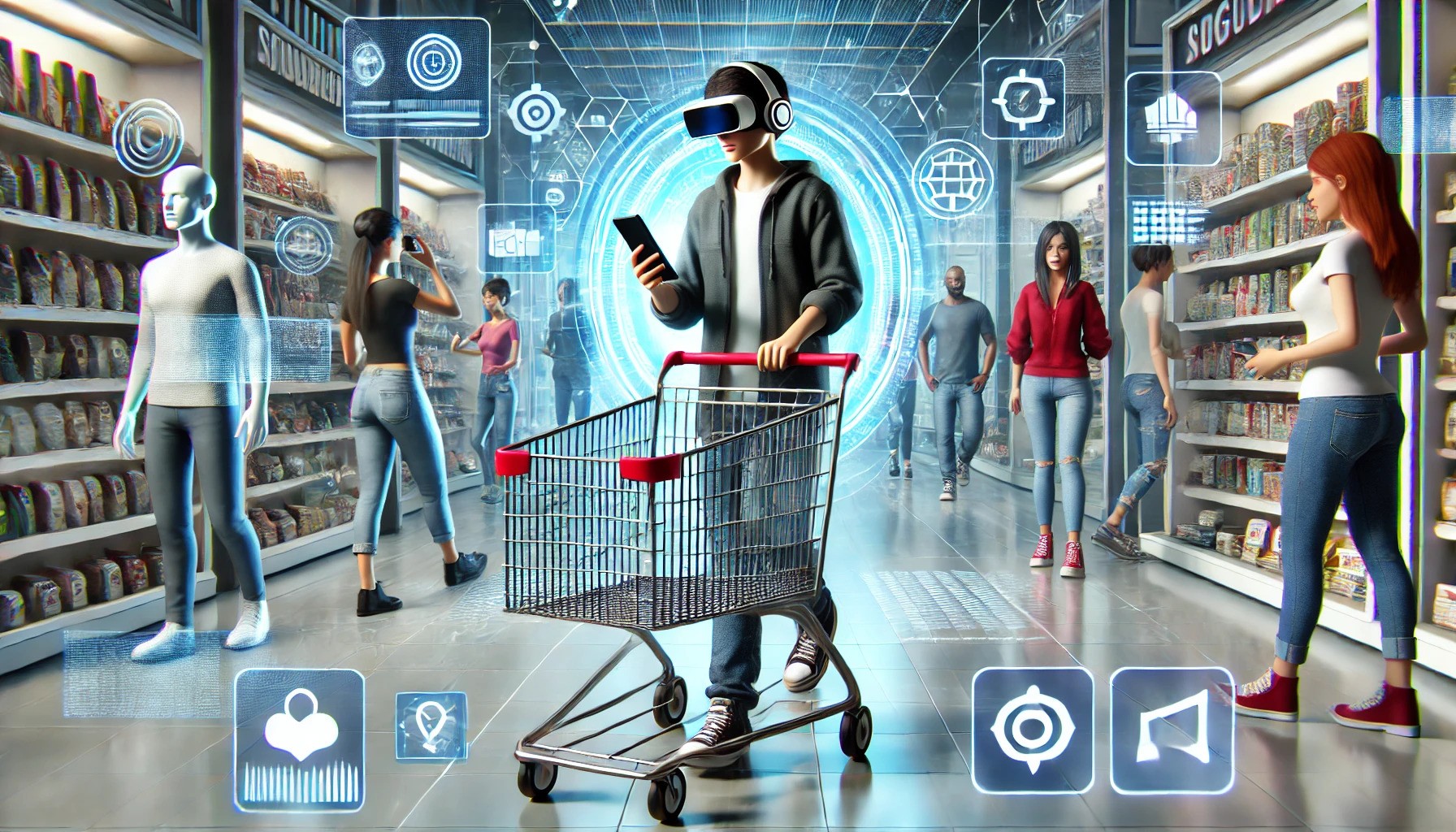Using AI in ecommerce is no longer a vague concept from the future. It is a present-day reality and even more than that – it has become a necessity for big players to stay ahead in the game. Sooner than most people think it will actively disrupt the ecommerce landscape for small and medium-sized business owners. Investing in speed, efficiency and customer satisfaction has never been as important as today if you wish to be competitive in the near future.
Ecommerce AI is a fusion of predictive analytics, personalized customer experiences, and enhanced operational efficiency. Let’s examine below how the pioneers are already embracing AI to transform ecommerce…forever.
Personalization at its Peak
Did you know that personalization in ecommerce can increase sales by 10% or more (according to a McKinsey report)? Using AI in ecommerce personalization is pushing the boundaries of customer engagement and satisfaction even further.
The power of AI predictive models is in their ability to make sense of customers’ purchase histories and browsing behaviors. They analyze customer data in real-time and can curate personalized ads, content, and product recommendations.
A study by Evergage found that 88% of marketers reported measurable improvements due to personalization, with 63% experiencing increased conversion rates.
Let’s look at how Amazon uses AI in ecommerce algorithms to create this hyper-personalization. Amazon’s AI collects and examines large data sets of what users have purchased before, what they were browsing for and even the time they spent on specific product pages. This data is then used to generate highly personalized product recommendations.
Starbucks’ AI personalizes their customers’ mobile app experience by recommending drinks based on purchase history and time of the day. This shopping experience feels uniquely tailored to each individual and helps Starbucks maintain a stronger connection with their customers.
Using AI in ecommerce personalization can go beyond product recommendations. Dynamic pricing is another wonderful AI tool in personalization. Companies like Uber and Delta are already using AI to adjust prices in real-time based on time, demand and behavior.
For example, UBER’s AI pricing algorithm can balance supply and demand automatically by increasing ride prices during periods of high demand. This strategy makes sure that prices are competitive and that the company will maximize revenue while still providing value to customers.
Conversational AI: Bridging Gaps
Till now offering 24/7 customer support was a costly luxury for brands. With conversational AI this is no longer an issue. Customers can now get assistance whenever they need it, regardless of time zones or business hours.
Using AI in ecommerce provides round-the-clock personalized customer support. The AI-driven tools take care of customer inquiries fast and efficiently. They could as well, facilitate a seamless shopping experience and even offer personalized advice.
The integration of natural language processing enables AI to understand and process human language more effectively. The result is a fast and useful interaction that feels like texting or calling a friend.
H&M’s virtual assistant is available 24/7 to assist customers with a wide range of needs. Customers could ask the H&M’s bot for a simple task such as order tracking. But they could as well make a more complex and personalized inquiry such as receiving styling tips tailored to individual tastes.
Ecommerce AI help businesses offer multilingual support to clients. Alibaba’s AI-powered chatbot, AliMe, supports multiple languages and even dialects. This capability is crucial for global e-commerce platforms looking to provide consistent and high-quality support across various markets
AI for Predictive Analytics in Ecommerce: A Game Changer
Using AI in ecommerce has one significant application and this is understanding and forecasting customer behavior. This capability is not only used for curated product recommendations, as we saw above. It also enables businesses to deeply understand customers’ preferences and accurately pinpoint future behaviors. Predictive analytics allows brands to custom tailor their marketing strategies and create more effective campaigns.
The AI predictive skills also help businesses identify and retain their most loyal customers by understanding their lifetime value. The AI tools analyze big sets of data on how customers were acquired, what are their spending patterns, and other relevant behaviors. Companies then can easily identify high-value customers and develop custom strategies to retain them.
Brands like Walmart, Zara and more use AI to analyze trends and patterns in sales data. They predict future demand for products, help manage inventory in real-time and easily identify best-sellers items and items that no one wants.
Ecommerce AI & Augmented Reality (AR): A Synergistic Duo
AR allows customers to virtually explore shops and even try on clothes, shoes and makeup. This wouldn’t be possible of course without the AI image recognition capabilities. Together, they create an interactive and immersive shopping experience like never before.
Cool to try on your glasses before your purchase? This is exactly what Warby PArker does. Customers can see how different frames look on their faces using smartphone cameras. In the meantime the AI tool adds more value to the experience by recommending frames based on the user’s face shape and style preferences. This makes the whole online shopping experience not just more enjoyable but a lot more efficient.
Customers of Sephora can actually try on makeup virtually. The Sephora assistant analyzes the user’s facial features and then applies different shades of makeup in real-time while also making suggestions based on skin pigmentation, color combinations and more.
Virtual store tours and interactive product demonstrations are another great application of the VR – AI love story. Macy’s and Ikea are already delighting their customers. You can take an actual virtual look of how their furniture or decoration items will look like in your home.
Lowe’s went one step further in engaging their customers by developing a VR experience called Holoroom How To. Customers can enter a virtual environment where they can actually learn how to do various tasks themselves, such as tiling a bathroom or installing a sink. At the same time the Holorrom uses AI to personalize. It adjusts the difficulty level based on the customer’s skill and previous progress.
Fraud Detection and Security
Good and bad players on the internet have been in a race since the beginning. With the emergence of AI, fraud detection and security seem to gain an advantage. AI-driven systems can monitor and analyze vast amounts of data. They recognize patterns and anomalies in real-time and create an overall safer shopping environment for all.
Fraudulent payments are among the most common problems. Amazon uses machine learning models to detect suspicious activities. They use AI in ecommerce to monitor and analyze all data, including payment history, card information, and purchasing behavior.
AI is also capable of enhancing account security by preventing unauthorized access and usage. Alibaba is already using AI to protect its customers’ profiles on the e-commerce platform. Any sensitive data can be deployed to work and be analyzed for protection purposes, by AI.
Ecommerce platforms handle a lot of personal and financial information. AI security systems may encrypt data, keep an eye for security breaches and respond in real time.
Shopify’s AI system constantly observes the platform for potential vulnerabilities. Most importantly, it automatically patches any breaches, making sure their numerous customers are safe and secure.
In addition, AI-driven fraud detection systems are constantly learning, adapting and predicting, leaving little room for fraudsters to develop their malicious activities.
======
FANA.AI integrates AI in ecommerce, offering solutions that cater to the nuanced needs of the sector. With our focus on resolving FAQs and enhancing customer support, FANA.AI leverages AI to increase response accuracy and boost community management efficiency. By automating routine tasks, FANA allows customer experience teams to concentrate on more critical functions, thereby enhancing overall operational efficiency. The seamless integration with platforms like ZenDesk and Telegram further underscores FANA.AI’s commitment to improving customer engagement and support across various channels.












